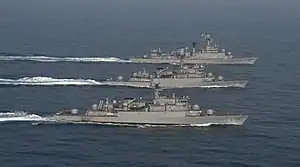 Gongju (closest to camera) in 2016 | |
| History | |
|---|---|
| Name |
|
| Namesake | Gongju |
| Builder | Hanjin |
| Launched | 21 September 1992 |
| Commissioned | 31 July 1993 |
| Identification | Pennant number: PCC-785 |
| Status | Active |
| General characteristics | |
| Class and type | Pohang-class corvette |
| Displacement | 1,220 tons |
| Length | 289.7 ft (88 m) |
| Beam | 33 ft (10 m) |
| Draft | 2.9 ft (0.88 m) |
| Installed power | 2 × MTU 6V396 TC52 diesel generators |
| Propulsion |
|
| Speed | 32 knots (59 km/h; 37 mph) maximum |
| Range | 4,000 nmi (7,400 km; 4,600 mi) at 15 knots (28 km/h; 17 mph) using diesel engines |
| Endurance | 20 days |
| Boats & landing craft carried | 2 × RHIB |
| Crew | 118 |
| Sensors and processing systems | |
| Electronic warfare & decoys |
|
| Armament |
|
ROKS Gongju (PCC-785) is a Pohang-class corvette of the Republic of Korea Navy.[1]
Development and design
The Pohang class is a series of corvettes built by different Korean shipbuilding companies. The class consists of 24 ships and some after decommissioning were sold or given to other countries. There are five different types of designs in the class from Flight II to Flight VI.[2]
Construction and career
Gongju was launched on 21 September 1992 by Hanjin Heavy Industries. The vessel was commissioned on 31 July 1993.
References
- ↑ "Republic of Korea Navy ROKN Destroyer Frigate Submarine". www.seaforces.org. Retrieved 2021-07-13.
- ↑ "Pohang (PCC Patrol Combat Corvette)". www.globalsecurity.org. Retrieved 2021-01-10.
This article is issued from Wikipedia. The text is licensed under Creative Commons - Attribution - Sharealike. Additional terms may apply for the media files.